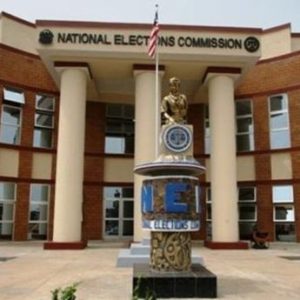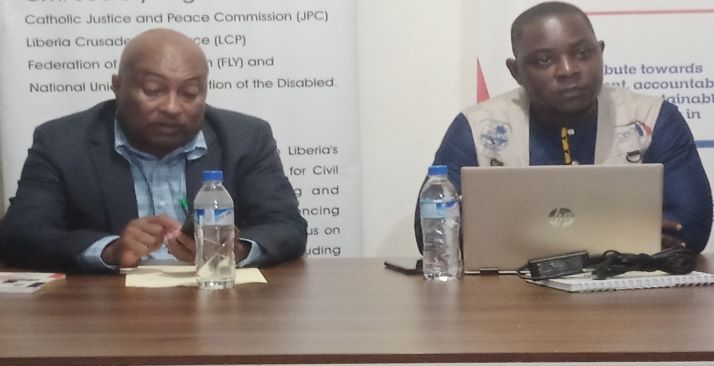PHOTO: ECC Chairman, Cllr. Oscar Bloh (Left) and an official of LEON during a news conference
By Augustine Octavius, augustineoctavius@gmail.com
Two leading civil society organizations in the electoral sector have expressed grave concern on the slow pace of the process by the National Elections Commission in handling key process leading to the holding to the presidential and legislative elections
The Elections Coordinating Committee (ECC) and the Liberia Elections Observation Network (LEON)said the delay in the implementation of key processes leading to the elections are early warning indicators for conflict.
Addressing a joint press conference in Monrovia at the weekend (Friday, November 4, 2022), ECC Chairman, Cllr. Oscar Bloh, said they are dissatisfied on the manner NEC, uncertainty and the lack of information surrounding the tendering for the biometric voters registration kits for the elections.
ECC and LEON added that they are deeply concern about the uncertainties and the lack of access to public information surrounding tendering for the biometric voters registration kits which could affect the timely conduct of the 2023 presidential and legislative elections.

“The credibility of voter registration is a prerequisite for the conduct of a credible elections and as such, due care must be taken in the conduct of this exercise,” Mr. Bloh said.
According to him, the credibility of elections is key to sustaining the peace and security of the state and this process requires time, openness, inclusion and timely allocation of resources from the national government to undertake major activities leading up to election day.
ECC and LEON made it clear that the delay in the conduct of the national census and voter registration run the following risks.
They enumerated the risks as qualified voters may not be captured to vote in 2023, failure of NEC to reapportion constituencies based on the new population figures in adherence to the Liberian Constitution.
“it is shocking that less than one year before the elections, these pre-requisite processes, which should have been already concluded, are yet to begin,” he said; adding: “Liberia uses the census and the voter registration as the data for the delimitation and with the delay and uncertainty chances are the country may run into a crisis leading to mal-apportionment and distortion the equality of representation.
“These factors combined have the potential to reduce public trust in the electoral process.”
ECC and LEON are of the view that the back-and-forth proceedings between the NEC and the PPCC are clear demonstration of the lack of coordination that are needed for the timely procurement of election materials.
The two CSOs claimed that they believed that conducting census and voter registration in the same year with limited awareness could undermine the quality of the electoral process and integrity of its outcome.
Meanwhile, the ECC and LEON have advanced a three-count recommendation among other things calling on the Liberian government through the NEC and the PPCC have an internal discussion to reach a compromise on the procurement of the biometric voter registration kit without necessary violating the PPCC law and ensure the credibility and integrity of the process
ECC and LEON also proposed that the selection of a vendor by the NEC should be done in a transparent and accountable manner with the timely dissemination of information to the public
The two organizations resolved that international partners supporting the conduct of the 2023 presidential and legislative elections regularly meet with political parties and CSOs on the formulating the scenarios that have the potential to undermine the electoral process and how they can be mitigated
The joint press statement by ECC and LEON is significant because they are two largest domestic elections observation groups comprising of several network organizations in Liberia
These two CSOs are working together purposely to ensure a credible and integrity of electoral management in Liberia.
LEON is funded by SIDA and the ECC works in partnership with the Democracy International with funding from the United States Agency for International Development (USAID).

